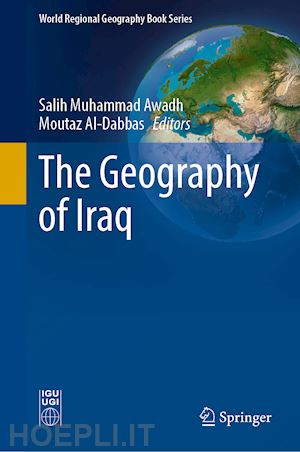

Questo prodotto usufruisce delle SPEDIZIONI GRATIS
selezionando l'opzione Corriere Veloce in fase di ordine.
Pagabile anche con Carta della cultura giovani e del merito, 18App Bonus Cultura e Carta del Docente
Human civilization first emerged in ancient Mesopotamia, where the first writing and the first technologies originated. Writing about Mesopotamia the Cradle of Civilization (the land between the rivers, the Tigris and Euphrates Rivers, modern-day Iraq) is interesting for all interesting readers in the world. Iraq is one of the most beautiful, diverse, and impressive countries in the world. Iraq has a diverse range of environments, landscapes, inhabitants, activities, and cultural heritage, and human civilization has a lot to offer. An extensive collection of original materials gathered over the past few decades was used to elaborate on the geography of Iraq in a novel-length book. The geography of Iraq includes detailed information on its physical, human, economic, historical, and environments. Readers, students, and teachers from all over the world who seek out this information will be satisfied with the various figures, maps, and photographs due to the extra value added.
Chapter1. Introduction.- Chapter2. Historical Geography.- Chapter3. Physical Geography.- Chapter4. Water Resources.- Chapter5. Human Geography.- Chapter6. Economic Geography.- Chapter7. Potential Geoparks sustainable development.- Chapter8.Natural Resources.
Salih Muhammad Awadh is a Professor of Geochemistry in the Department of Geology at the College of Science, University of Baghdad. In 1986, he earned a Bachelor of Science in Geology; in 1992, he acquired a Master's degree in Geochemistry and got a Doctorate in Geochemistry and Economic Geology in 2006 from the University of Baghdad, finished a post-doctoral program at the University of Warsaw in Poland in 2014. He has more than thirty years of experience in the field of geochemistry. He is keenly interested in Ore Geology, Petroleum Geochemistry, Hydrogeochemistry, Medical Geology, Urban Geochemistry, and Environmental and Climatic Studies. He holds the position of Editor-in-Chief at the Iraqi Geological Journal-Scopus-Elsevier indexed. He has supervised more than 30 theses. He has published around 130 research papers and edited ten scholarly books. He discovered a novel theory that predicts earthquake events.
Prof. Dr. Moutaz A. Al-Dabbas is a Professor in the Department of Geology, College of Science, University of Baghdad. Place and date of birth: Babylon, 1952. Bachelor of Geology 1974 Baghdad University; PhD in Environmental Marine Geology, University of Dundee, United Kingdom, 1980. Supervised 28 doctoral theses and 38 master’s theses Published in international and Iraqi scientific journals: 155 papers. Participated in 67 seminars and conferences inside and outside Iraq. Director of the Scientific Affairs Department at the University of Baghdad from 1997 to 1999. Director of the Central Environmental Laboratory / College of Science, University of Baghdad, from 2013 until 2015. Director of the Scientific Consulting Office, College of Science, University of Baghdad, from 2006 to 2017. National expert and member of the National Committee for Combating Dust Storms. Wrote a book individually in 2016 and published it in cooperation with the German Lambert Publishing Company entitled (Desertification and dust storms in Iraq: focusing on the Al-Razzaza Al-Habbariyah region) Participated in writing a book in 2016 entitled (Global Assessment of Sand and Dust Storms), which was published in cooperation with the United Nations, represented by UNDP WMO UNCCD, and published in 2017. Member of the National Technical Committee for the Salinity Management Project in Central and Southern Iraq, in cooperation with ICARDA, and participated in the completion of the reports of the Salinity Management Project in Central and Southern Iraq, including two books for the years 2012 and 2013, which were published on the Internet. Obtaining membership in the International Hydrogeology Journal editorial board, published by the German Scientific Publishing House, as of March 2017











Il sito utilizza cookie ed altri strumenti di tracciamento che raccolgono informazioni dal dispositivo dell’utente. Oltre ai cookie tecnici ed analitici aggregati, strettamente necessari per il funzionamento di questo sito web, previo consenso dell’utente possono essere installati cookie di profilazione e marketing e cookie dei social media. Cliccando su “Accetto tutti i cookie” saranno attivate tutte le categorie di cookie. Per accettare solo deterninate categorie di cookie, cliccare invece su “Impostazioni cookie”. Chiudendo il banner o continuando a navigare saranno installati solo cookie tecnici. Per maggiori dettagli, consultare la Cookie Policy.